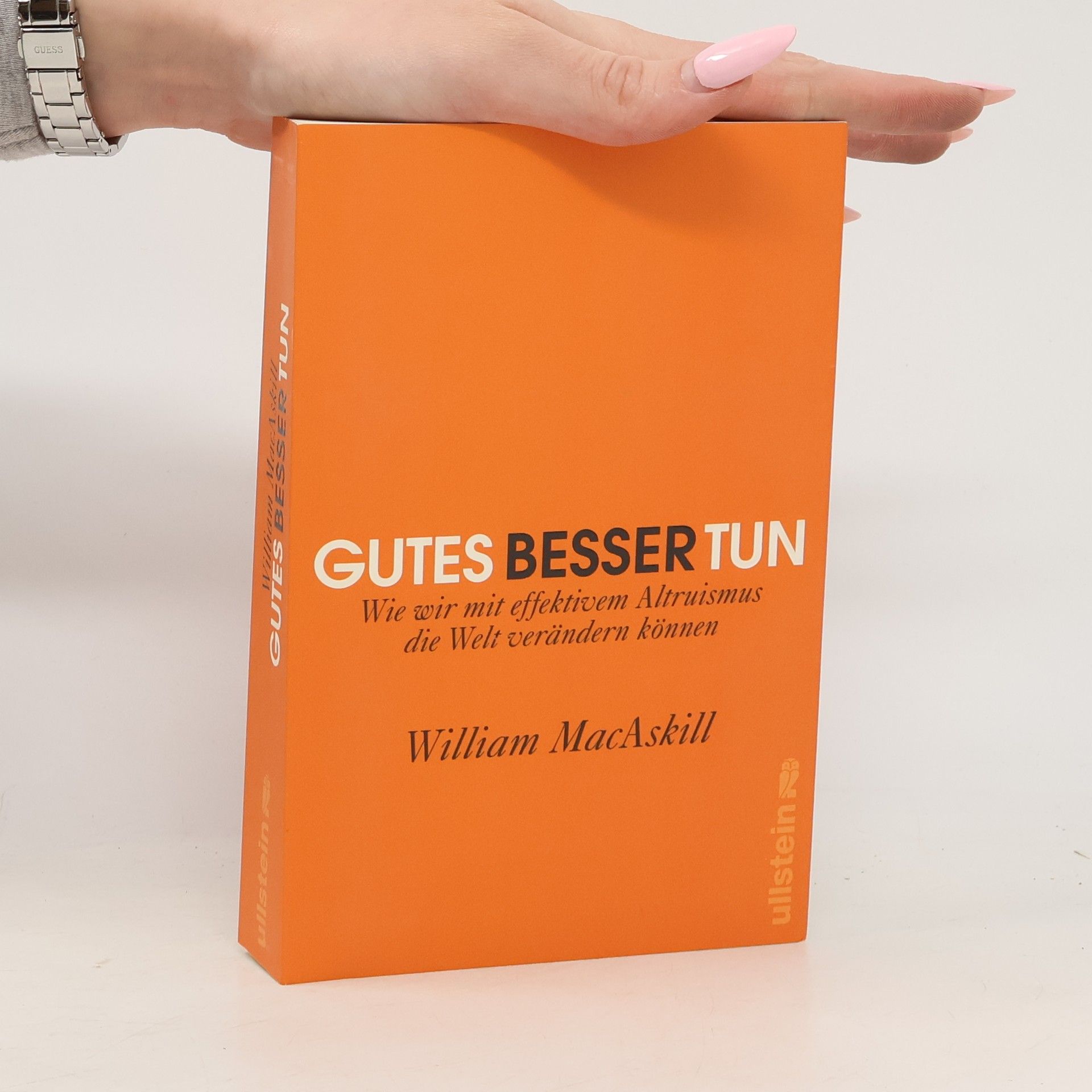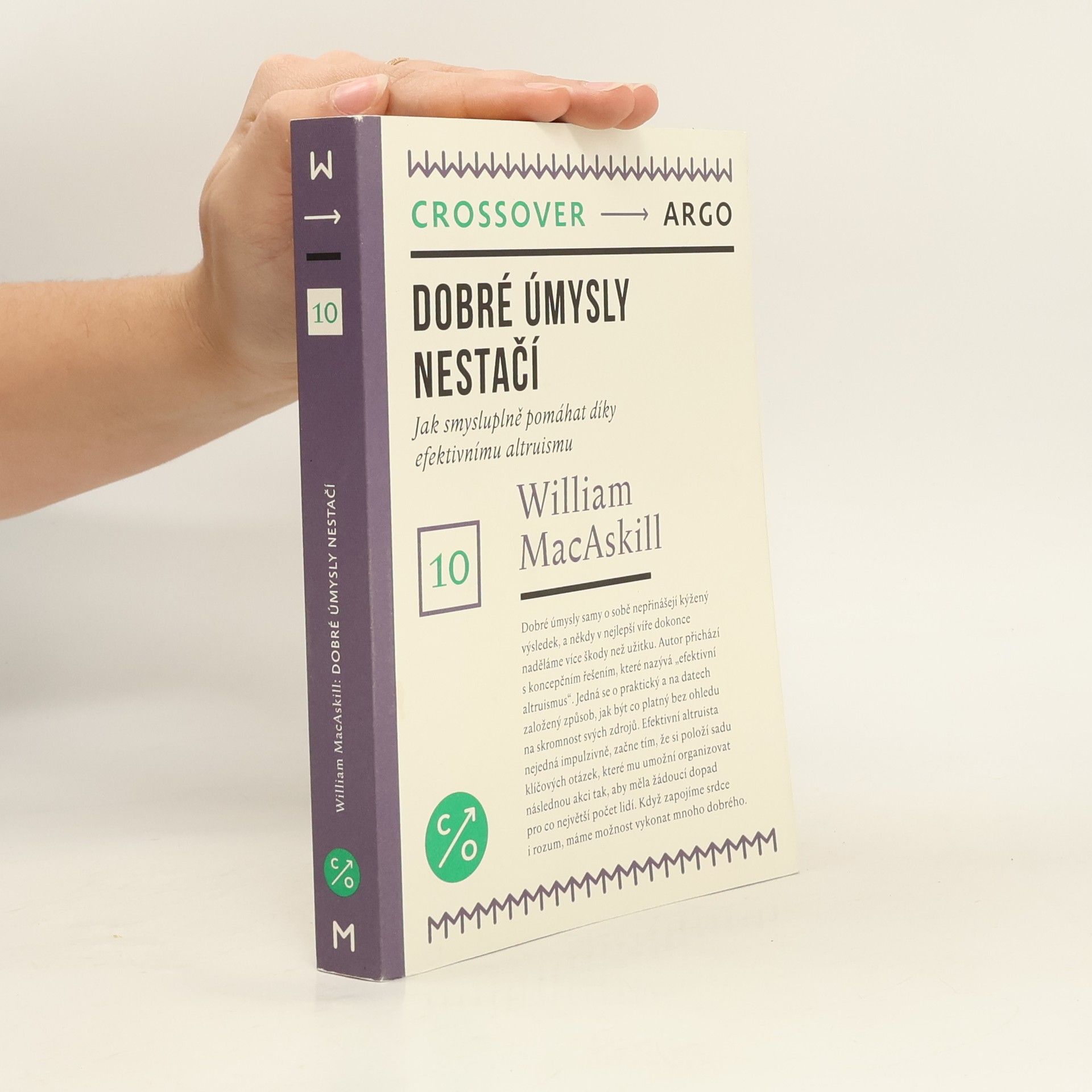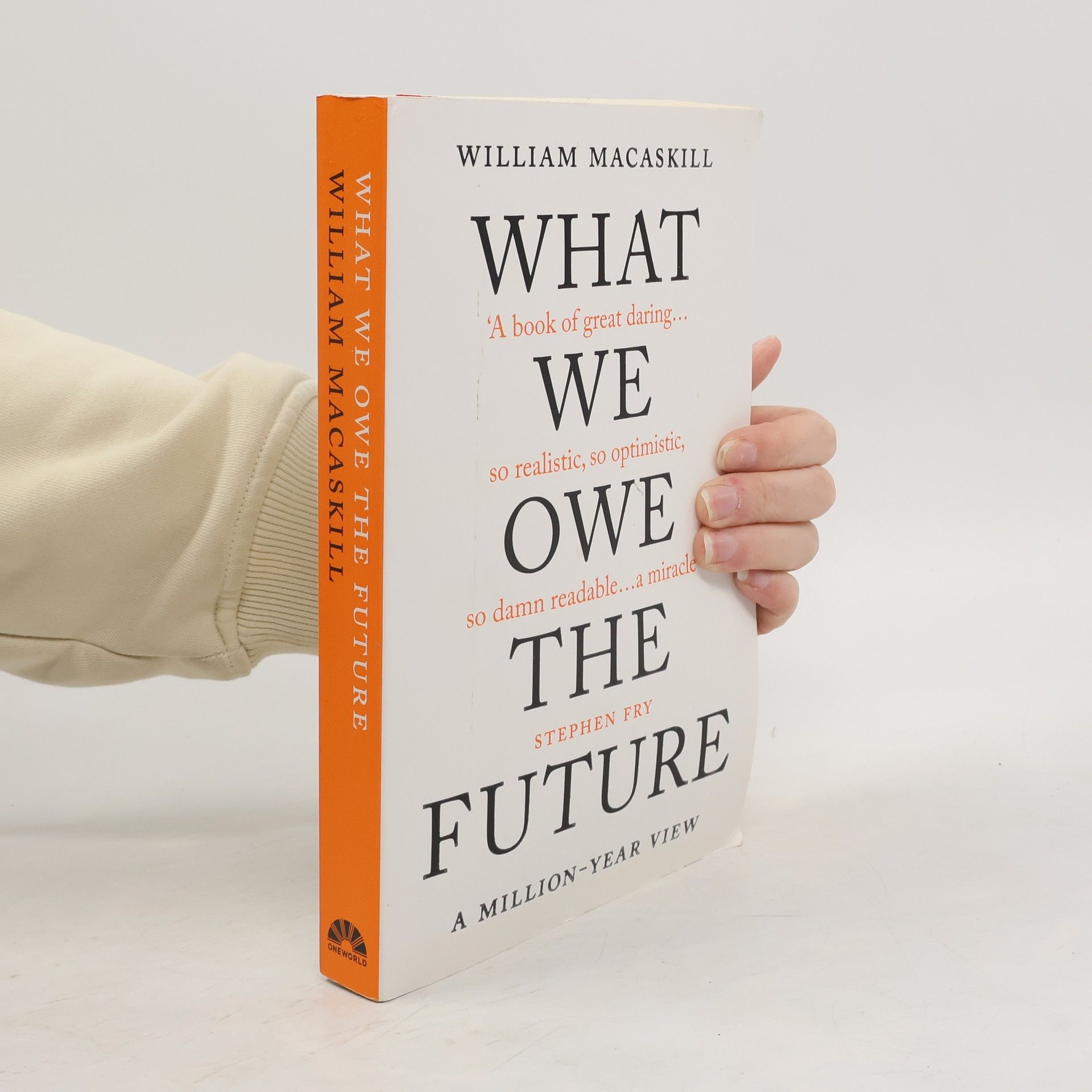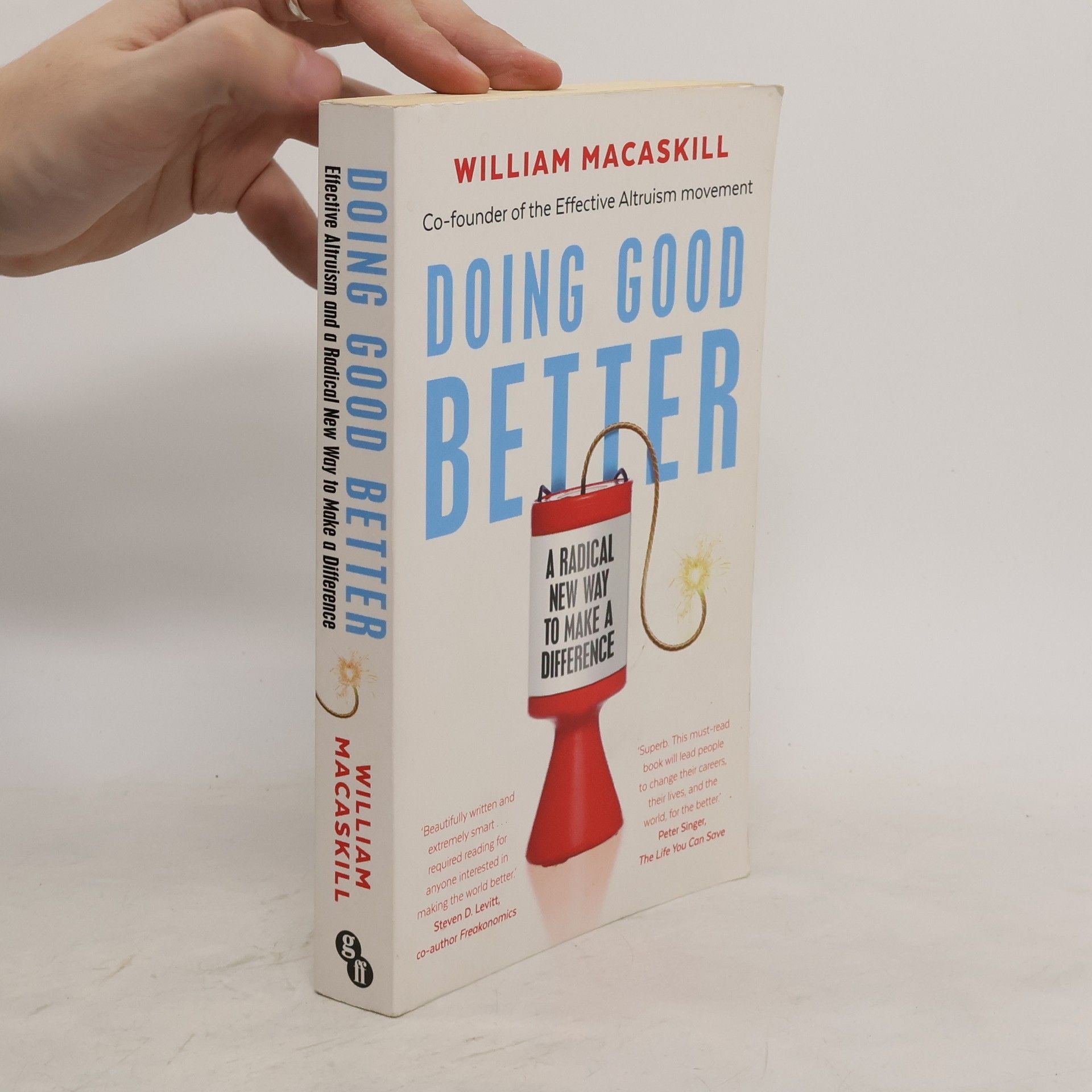Doing good better: effective altruism and a radical new way to make a difference
- 336pagine
- 12 ore di lettura
A radical reassessment of how we can most effectively help others by a rising star of philosophy and leading social entrepreneur.
Will MacAskill è un filosofo che si concentra su come possiamo aiutare al meglio gli altri. Il suo lavoro approfondisce il processo decisionale etico e su come indirizzare efficacemente le risorse per risolvere problemi globali. Esamina i fondamenti filosofici della filantropia e i metodi pratici per massimizzare l'impatto positivo delle nostre azioni. Le sue analisi incoraggiano una riflessione più profonda sulle responsabilità che abbiamo verso il mondo.







A radical reassessment of how we can most effectively help others by a rising star of philosophy and leading social entrepreneur.
Almost all of us want to make a difference. So we volunteer, donate to charity, recycle or try to cut down our carbon emissions. But rarely do we know how much of a difference we're really making. In a remarkable re-examination of the evidence, Doing Good Better reveals why buying sweatshop-produced goods benefits the poor; why cosmetic surgeons can do more good than charity workers; and why giving to a relief fund is generally not the best way to help after a natural disaster. By examining the charities you give to, the volunteering you do, the goods you buy and the career you pursue, this fascinating and often surprising guide shows how through simple actions you can improve thousands of lives - including your own.
"One of the most stunning achievements of moral philosophy is something we take for granted: moral universalism, or the idea that every human has equal moral worth. In What We Owe the Future, Oxford philosopher William MacAskill demands that we go a step further, arguing that people not only have equal moral worth no matter where or how they live, but also no matter when they live. This idea has implications beyond the obvious (climate change) - including literally making sure that there are people in the future: It's not unusual to hear someone way, "Oh, I could never bring a child into this world." MacAskill argues that the sentiment itself may well be immoral: we have a responsibility not just to consider whether the world of the future will be suitable for supporting humans, but to act to make sure there are humans in it. And while it may seem that the destructive capacity of modern industrial technology means that we ought to eschew it as much as possible, MacAskill argues for optimism in our ability to (eventually) get technology right, for the future's benefit, and ours.
Stává se to často: rozhodli jsme se pomoci, ale místo abychom nejdříve shromažďovali fakta a naplánovali co nejúčinnější strategii, necháme se strhnout silnými emocemi. Dobré úmysly samy o sobě nepřinášejí kýžený výsledek, a někdy v nejlepší víře dokonce naděláme více škody než užitku. Autor přichází s konceptem efektivního altruismu, praktickým a na datech založeným způsobem, jak být co platný bez ohledu na skromnost svých zdrojů. Efektivní altruista nejedná impulsivně, začne tím, že si položí sadu klíčových otázek, které mu umožní organizovat následnou akci tak, aby měla žádoucí dopad pro co největší počet lidí. Když zapojíme srdce i rozum, máme možnost vykonat mnoho dobrého.
Soll ich einen Flüchtling bei mir beherbergen? Ist es sinnvoll, nach Naturkatastrophen zu spenden? Übernehme ich besser die Patenschaft für ein Kind aus Äthiopien oder für ein Kind aus Deutschland? Helfe ich den Betroffenen, oder beruhige ich nur mein Gewissen? William MacAskill hat mit dem Konzept des effektiven Altruismus eine Antwort gefunden. Er nennt die Kriterien für sinnvolles und nachhaltiges Helfen. Oft sind es scheinbar kleine Handlungen, die Großes bewirken: Eine einfache Wurmkur verbessert die Lebensqualität afrikanischer Kinder mehr als eine teure Wasserpumpe fürs ganze Dorf. MacAskill zeigt, warum gut gemeint und gut gemacht zwei verschiedene Dinge sind und wie wir Veränderungen am besten erreichen können. Sein Buch ist eine konkrete Handreichung für alle, die Gutes noch besser tun wollen.
Warum wir jetzt darüber entscheiden, ob wir die nächste Million Jahre positiv beeinflussen - New York Times-Bestseller
Wie wir mit den richtigen Entscheidungen den Enkeln unserer Enkel ein Leben in Sicherheit und Glück ermöglichen »Dieses Buch ist ein monumentales Ereignis.« Rutger Bregman Der britische Philosoph und Aktivist Will MacAskill fordert ein radikal neues Denken beim Thema Nachhaltigkeit: Unser heutiges Handeln muss nicht nur die Konsequenzen für die nächsten Generationen miteinbeziehen, sondern auch die Folgen für die Menschheit in einer weit entfernten Zukunft. Es reicht nicht aus, den Klimawandel einzudämmen oder die nächste Pandemie zu verhindern. Wir müssen sicherstellen, dass sich die Menschheit nach einem Kollaps auch wieder erholt. Ein Manifest von enormer Sprengkraft – minutiös recherchiert und brillant geschrieben. Mit zahlreichen Abbildungen und Grafiken. Ausstattung: Mit zahlreichen Grafiken und Fotos
Spisane dzieje ludzkości sięgają zaledwie pięciu tysięcy lat wstecz, a historia tego, co dopiero przed nami, może objąć jeszcze całe milenia… albo zakończyć się jutro. Od wyborów dokonanych przez nas zależy, czy nasze wnuki będą żyć w szczęściu i dobrobycie, a zasoby naszej planety nie wyczerpią się u kresu ich życia. William MacAskill, oksfordzki filozof, zapoznaje czytelników z longtermizmem – koncepcją, zgodnie z którą priorytetem moralnym naszych czasów powinno być działanie na rzecz jak najlepszej przyszłości ludzi. Jednak jeśli chcemy, aby nasza cywilizacja przetrwała, nie wystarczy, że będziemy pracować nad cofnięciem zmian klimatycznych czy powstrzymaniem kolejnej pandemii. Wyzwania, jakie stoją przed nami, to także przygotowanie przyszłych pokoleń do życia na planecie, na której będzie królować inteligencja sztuczna, a nie biologiczna, koroną stworzenia zaś będą byty cyfrowe, a nie ludzie. Musimy mieć pewność, że nasza cywilizacja podniesie się po każdym upadku i zadbać o jej technologiczny i moralny rozwój.